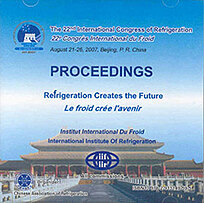
Document IIF
Une méthode inverse par paramètres groupés pour la détermination des coefficients de transfert de chaleur pour un refroidisseur industriel à air pulsé.
An inverse lump parameter method for determination of heat transfer coefficients for an industrial air blast chiller.
Auteurs : MOHAMED I. O.
Résumé
An inverse model using lump body was developed to calculate heat transfer coefficients as a dynamic function of time. The model used sequential function specification algorithm to calculate surface heat flux from transient temperature measurements inside a lump body system. Transient temperature measurements were collected during cooling inside an industrial chiller at two different positions with different air velocities using four replicates for each position. The calculated surface heat flux was found two be very accurate as the maximum value of the root mean squares of error for temperature is 0.045°C, lower than the expected error form thermocouple measurements. The calculated heat flux was then used to calculate heat transfer coefficients as a dynamic function of cooling time followed by calculation of time average heat transfer coefficient using numerical integration. The approach developed here could be a pragmatic powerful tool to model special variation of heat transfer coefficients for industrial refrigeration units.
Documents disponibles
Format PDF
Pages : ICR07-C2-1280
Disponible
Prix public
20 €
Prix membre*
Gratuit
* meilleur tarif applicable selon le type d'adhésion (voir le détail des avantages des adhésions individuelles et collectives)
Détails
- Titre original : An inverse lump parameter method for determination of heat transfer coefficients for an industrial air blast chiller.
- Identifiant de la fiche : 2008-0297
- Langues : Anglais
- Source : ICR 2007. Refrigeration Creates the Future. Proceedings of the 22nd IIR International Congress of Refrigeration.
- Date d'édition : 21/08/2007
Liens
Voir d'autres communications du même compte rendu (839)
Voir le compte rendu de la conférence
Indexation
-
HEAT TRANSFER IN FLUIDIZED AND VIBRO-FLUIDIZED ...
- Auteurs : MARHIC L. R., SINGH R. P.
- Date : 24/08/1987
- Langues : Anglais
- Source : Development in refrigeration, refrigeration for development. Proceedings of the XVIIth international Congress of Refrigeration.
- Formats : PDF
Voir la fiche
-
Infiltration rate determination for low-tempera...
- Auteurs : REINDL D. T., JEKEL T. B.
- Date : 21/06/2008
- Langues : Anglais
- Source : ASHRAE Transactions. 2008 Annual Meeting, Salt Lake City, UT. Volume 114, part 2 + CD-ROM.
Voir la fiche
-
HEAT TRANSFER COEFFICIENTS IN THE AIR-BLAST FRE...
- Auteurs : PHAM Q. T., WILLIX J.
- Date : 24/08/1987
- Langues : Anglais
- Source : Development in refrigeration, refrigeration for development. Proceedings of the XVIIth international Congress of Refrigeration.
- Formats : PDF
Voir la fiche
-
APPLICATION OF DYNAMIC DISPERSE MEDIUM TO INTEN...
- Auteurs : DICHEV S.
- Date : 07/08/1983
- Langues : Anglais
- Source : [Refrigeration serving humanity]. Proceedings of the XVIth international Congress of Refrigeration.
- Formats : PDF
Voir la fiche
-
MEASURED VALUE ACQUISITION AND PROCESSING BY ME...
- Auteurs : KRUG W., WEBER B.
- Date : 03/09/1984
- Langues : Anglais
- Source : Advances in refrigeration and heat pump technology achieved by the application of micro-electronics and the control of systems by micro-electronic devices.
- Formats : PDF
Voir la fiche
